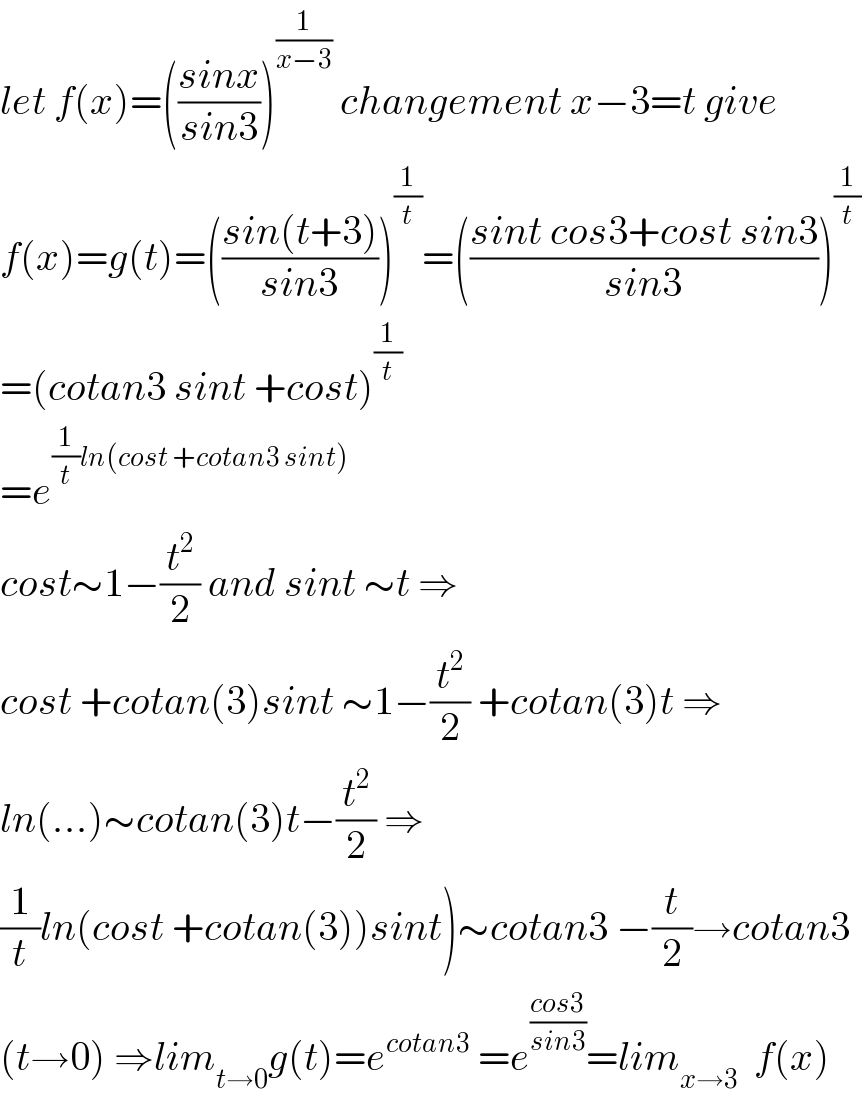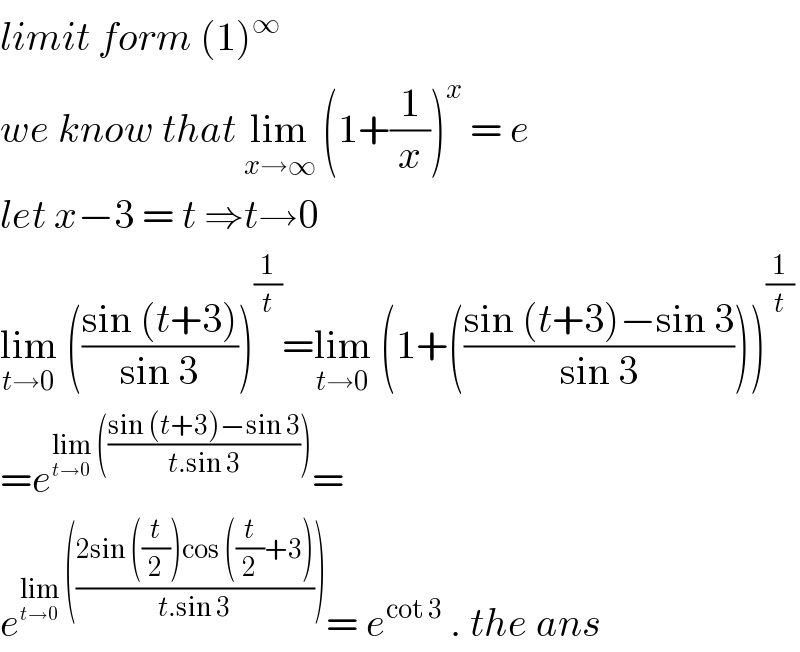Question Number 81096 by jagoll last updated on 09/Feb/20

$$\underset{{x}\rightarrow\mathrm{3}} {\mathrm{lim}}\:\left(\frac{\mathrm{sin}\:{x}}{\mathrm{sin}\:\mathrm{3}}\right)^{\frac{\mathrm{1}}{{x}−\mathrm{3}}} \:=? \\ $$
Commented by abdomathmax last updated on 09/Feb/20

$${let}\:{f}\left({x}\right)=\left(\frac{{sinx}}{{sin}\mathrm{3}}\right)^{\frac{\mathrm{1}}{{x}−\mathrm{3}}} \:{changement}\:{x}−\mathrm{3}={t}\:{give} \\ $$$${f}\left({x}\right)={g}\left({t}\right)=\left(\frac{{sin}\left({t}+\mathrm{3}\right)}{{sin}\mathrm{3}}\right)^{\frac{\mathrm{1}}{{t}}} =\left(\frac{{sint}\:{cos}\mathrm{3}+{cost}\:{sin}\mathrm{3}}{{sin}\mathrm{3}}\right)^{\frac{\mathrm{1}}{{t}}} \\ $$$$=\left({cotan}\mathrm{3}\:{sint}\:+{cost}\right)^{\frac{\mathrm{1}}{{t}}} \\ $$$$={e}^{\frac{\mathrm{1}}{{t}}{ln}\left({cost}\:+{cotan}\mathrm{3}\:{sint}\right)} \\ $$$${cost}\sim\mathrm{1}−\frac{{t}^{\mathrm{2}} }{\mathrm{2}}\:{and}\:{sint}\:\sim{t}\:\Rightarrow \\ $$$${cost}\:+{cotan}\left(\mathrm{3}\right){sint}\:\sim\mathrm{1}−\frac{{t}^{\mathrm{2}} }{\mathrm{2}}\:+{cotan}\left(\mathrm{3}\right){t}\:\Rightarrow \\ $$$${ln}\left(…\right)\sim{cotan}\left(\mathrm{3}\right){t}−\frac{{t}^{\mathrm{2}} }{\mathrm{2}}\:\Rightarrow \\ $$$$\left.\frac{\mathrm{1}}{{t}}{ln}\left({cost}\:+{cotan}\left(\mathrm{3}\right)\right){sint}\right)\sim{cotan}\mathrm{3}\:−\frac{{t}}{\mathrm{2}}\rightarrow{cotan}\mathrm{3} \\ $$$$\left({t}\rightarrow\mathrm{0}\right)\:\Rightarrow{lim}_{{t}\rightarrow\mathrm{0}} {g}\left({t}\right)={e}^{{cotan}\mathrm{3}} \:={e}^{\frac{{cos}\mathrm{3}}{{sin}\mathrm{3}}} ={lim}_{{x}\rightarrow\mathrm{3}} \:\:{f}\left({x}\right) \\ $$
Answered by john santu last updated on 09/Feb/20

$${limit}\:{form}\:\left(\mathrm{1}\right)^{\infty} \\ $$$${we}\:{know}\:{that}\:\underset{{x}\rightarrow\infty} {\mathrm{lim}}\:\left(\mathrm{1}+\frac{\mathrm{1}}{{x}}\right)^{{x}} \:=\:{e} \\ $$$${let}\:{x}−\mathrm{3}\:=\:{t}\:\Rightarrow{t}\rightarrow\mathrm{0} \\ $$$$\underset{{t}\rightarrow\mathrm{0}} {\mathrm{lim}}\:\left(\frac{\mathrm{sin}\:\left({t}+\mathrm{3}\right)}{\mathrm{sin}\:\mathrm{3}}\right)^{\frac{\mathrm{1}}{{t}}} =\underset{{t}\rightarrow\mathrm{0}} {\mathrm{lim}}\:\left(\mathrm{1}+\left(\frac{\mathrm{sin}\:\left({t}+\mathrm{3}\right)−\mathrm{sin}\:\mathrm{3}}{\mathrm{sin}\:\mathrm{3}}\right)\right)^{\frac{\mathrm{1}}{{t}}} \\ $$$$={e}^{\underset{{t}\rightarrow\mathrm{0}} {\mathrm{lim}}\:\left(\frac{\mathrm{sin}\:\left({t}+\mathrm{3}\right)−\mathrm{sin}\:\mathrm{3}}{{t}.\mathrm{sin}\:\mathrm{3}}\right)} = \\ $$$${e}^{\underset{{t}\rightarrow\mathrm{0}} {\mathrm{lim}}\:\left(\frac{\mathrm{2sin}\:\left(\frac{{t}}{\mathrm{2}}\right)\mathrm{cos}\:\left(\frac{{t}}{\mathrm{2}}+\mathrm{3}\right)}{{t}.\mathrm{sin}\:\mathrm{3}}\right)} =\:{e}^{\mathrm{cot}\:\mathrm{3}} \:.\:{the}\:{ans} \\ $$
Commented by jagoll last updated on 09/Feb/20

$${waw}\:{thank}\:{you}\:{sir} \\ $$
